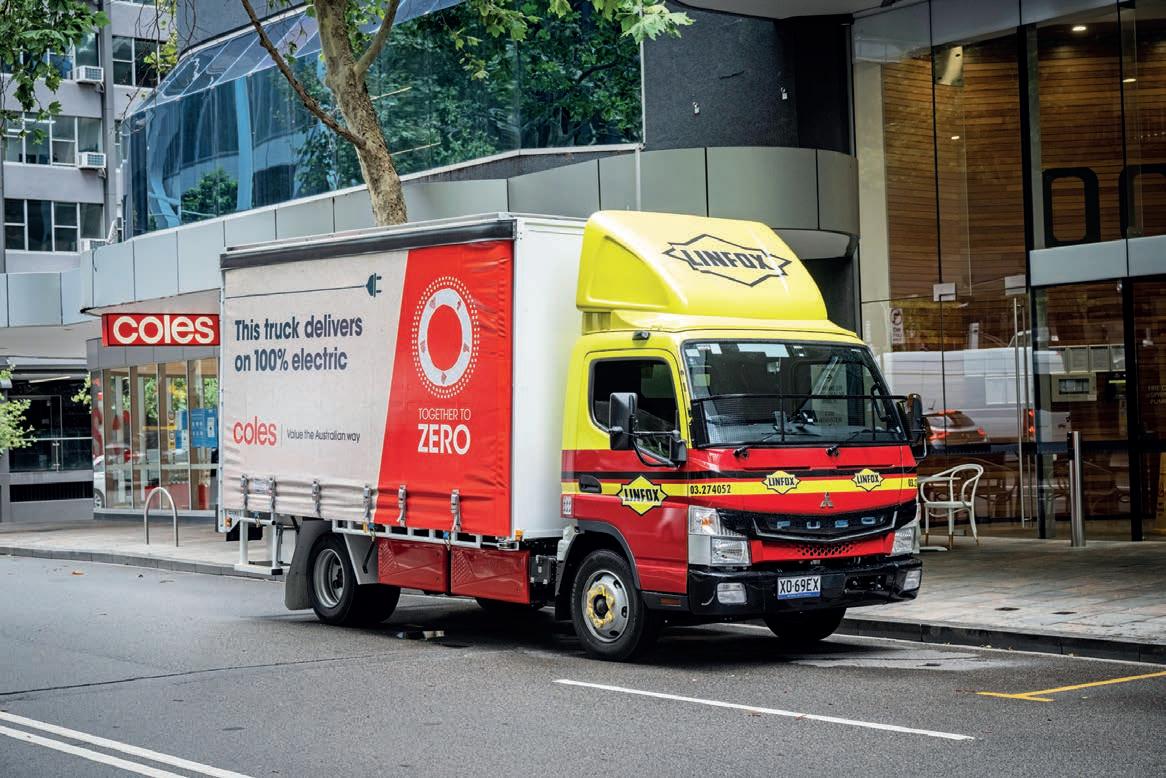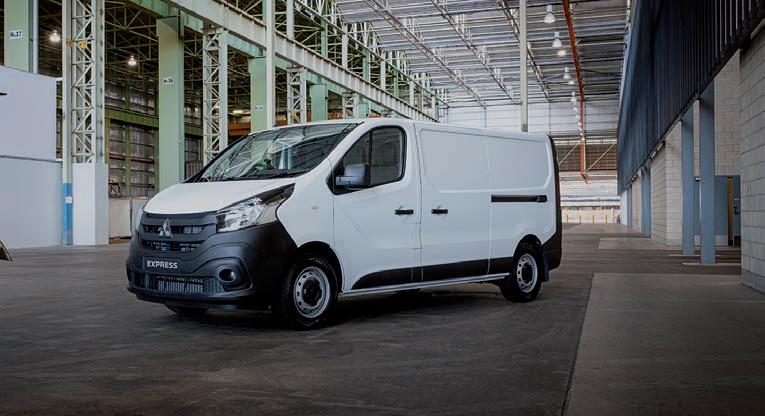
10 minute read
Delivery
by Prime Group
NEWS
MITSUBISHI EXPRESS DISCONTINUED IN AUSTRALIAN MARKET
Production of the Mitsubishi Express van is ending in Australia. After assessing current global business and supply conditions with Mitsubishi Motors Corporation, the decision has now been made to cease production of Australian market Mitsubishi Express. May was the final production month for short wheelbase (SWB) variants. Last year the Express van became the first vehicle to receive a zero-star ANCAP rating. It was reintroduced locally last year following a seven-year hiatus. Mitsubishi reportedly withdrew the previous Express van – an oldschool single box model – from the Australasian market in 2013 due to its failure to meet rapidly evolving safety and emissions standards. The commercial vehicle had managed a respectable market share of 6.5 per cent under the current iteration. Based on previous demand, vehicle supply is expected to remain available until late-2022. Due to supply and component-related issues, long wheelbase variants will not form part of the final allocation according to Mitsubishi. Existing long wheelbase supply is expected to be exhausted by mid2022. “Since joining the Australian market in mid-2020, the Mitsubishi Express Van range has delivered value for owners – from its competitive purchase pricing (from $39,040 plus on-road costs) through to its industry-leading 10/10 Diamond Advantage Program, which offers a 10-year manufacturer’s warranty and 10 years of competitive capped price servicing,” the company said in a statement. “With a healthy production allocation over its final months, Mitsubishi Motors Australia has ensured solid stocks of Express SWB, together with ongoing support of service, parts and accessories.”
Mitsubishi Express.
GENERAL MOTORS ELECTRIC VAN BREAKS DISTANCE RECORD
BrightDrop Zevo 600 en route to Washington DC.
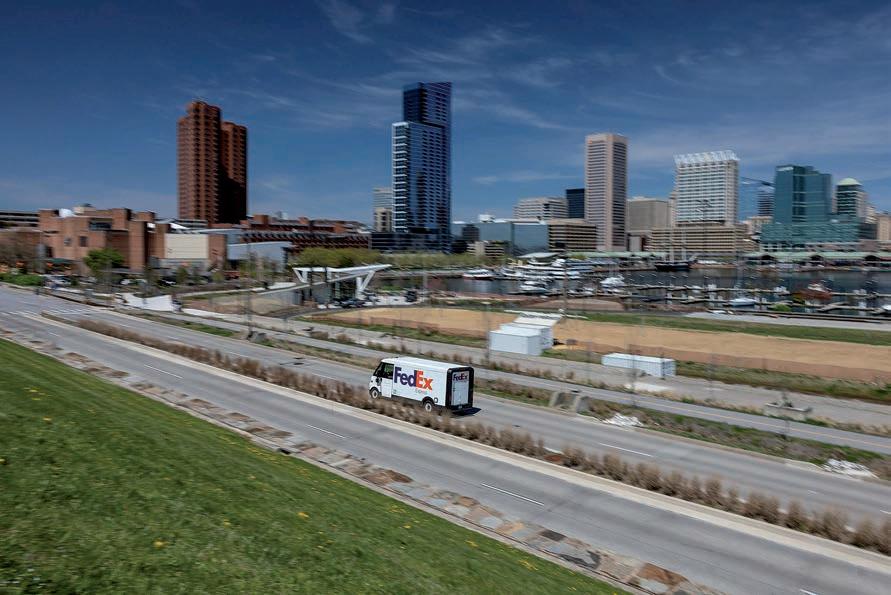
An EV manufactured by General Motors has set the Guinness World Record for the greatest distance travelled by an electric van on a single charge. BrightDrop, a venture by General Motors, in collaboration with FedEx achieved a distance of 418 kilometres. The BrightDrop Zevo 600 covered the journey from New York City to Washington DC in one single charge. With its top speed electronically limited to 65 mph, the record was set by Stephen Marlin, a client solutions account executive for BrightDrop, the division of General Motors that took the battery electric van from concept to production. The van, in doing so, also delivered a shipment of Full Circle sustainable cleaning products to a family-owned chain in Washington DC. Since conception, the Zevo 600 has been a record-setting vehicle, according to Travis Katz, BrightDrop CEO. “Now we are seeing first-hand what BrightDrop can do by pairing our zerooperating-emissions technology with FedEx, a leader in the transportation and delivery industry,” he said in a statement. “Having a long battery range with reliable power is critical to electrifying delivery fleets everywhere. This special delivery highlights our products’ advanced capabilities and our mission to decarbonise deliveries,” said Katz. BrightDrop delivered its first electric light commercial vehicles to FedEx in December after completing its first production builds of the Zevo 600 in just 20 months, making it the fastest vehicle to market in GM’s history. FedEx Chief Sustainability Officer, Mitch Jackson, said the company was proud to be part of the record-setting moment as it works toward a goal of achieving carbon-neutral operations by 2040. “Electrifying our entire parcel pickup and delivery fleet is a crucial component of that goal and we’re thrilled BrightDrop is bringing real solutions to the market that can help us get there,” he said. “I’ve long said sustainability is a team sport. Today’s milestone is a perfect example of how businesses can lead the charge in ushering in a more sustainable future for customers, our communities and our planet through collaboration.” The BrightDrop EV is equipped with various features including Automatic Emergency Braking, Front and Rear Park Assist and Forward Collision Alert.
NIRO PLUS FURTHERS KIA’S MOBILITY SOLUTIONS
Kia has launched its first ‘purpose-built vehicle’ (PBV). As a Sustainable Mobility Solutions Provider, Kia is exploring ways to help people and businesses move beyond traditional automotive. The company, according to a statement, expects its PBV models to be an important part of future mobility. The Kia Niro Plus will be deployed as a general model and zero-emission taxi in Korea, with the company modifying the first-generation Niro EV to make it suitable for the demands of modernday car-hailing. Its introduction follows the launch of the Ray Van in February, Korea’s first single-seater van designed to satisfy the growing national demand for small cargo delivery services. Kia is one of the first movers in the global PBV market and plans to become a market leader by 2030. To this end, the company is developing a dedicated platform upon which PBVs of different shapes and sizes can sit, meeting evolving customer needs and market trends. Kia’s first dedicated PBV model will launch in 2025, by which time the global PBV market is expected to mature. The brand’s first dedicated PBV will be similar in size to a mid-sized vehicle, with inherent scalability. “Kia is transforming its business strategy to focus on popularising EVs, and introducing new mobility products that are tailored to the needs of users in markets around the world,” said Sangdae Kim, Head of Kia eLCV Business Division. “The Niro Plus is our first step into the world of PBVs, a market that holds great potential for future development.” As the PBV market grows, Kia plans to gradually expand its range from micro to large PBVs that can potentially offer an alternative to public transportation or even be used as mobile offices. The general, non-taxi version of the Niro Plus will be made available in select overseas markets in the second half of the year. In addition to the battery electric vehicle (BEV) version, the Niro Plus will be available as plug-in hybrid (PHEV) and hybrid (HEV) electric vehicles in these markets, reflecting countryspecific characteristics and diverse customer needs. The Niro Plus taxi model is based on the first-generation Niro EV – Kia’s popular electric crossover. Since its launch in 2018, the Niro EV has sold globally, demonstrating the growing public appetite for versatile BEVs.
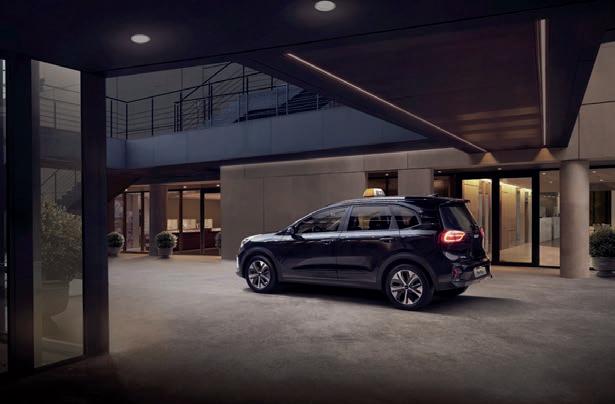
Kia Niro Plus.
TOYOTA HIACE SET FOR REAR BARN DOORS
A rear barn door arrangement will be offered on the Toyota HiAce later this year. Toyota Australia made the recent announcement following what it called strong customer demand. The wide-opening rear barn door option is expected to provide customers with a new ergonomic solution to suit user needs. With all versions of the HiAce now powered by Toyota’s 2.8-litre turbo diesel four-cylinder engine and mated to a six-speed automatic transmission, the leading OEM has added extra safety and security features to the latest HiAce vans following the introduction of its Toyota Connected Services initiative. Toyota was the market leader in passenger vehicle sales in March 2022. It had 38 per cent of the market in the 2.5t to 3.5t category having sold just over 800 units. Toyota expects the upcoming arrival of the rear barn door option some time in the second half of 2022. Toyota Australia will offer increased buyer choice for the HiAce van with the upcoming arrival of a rear barn door option, which will debut in Australia in the second half of 2022. More details Toyota have promised will be revealed closer to the model’s arrival in Australia.
Toyota HiAce with rear barn doors.
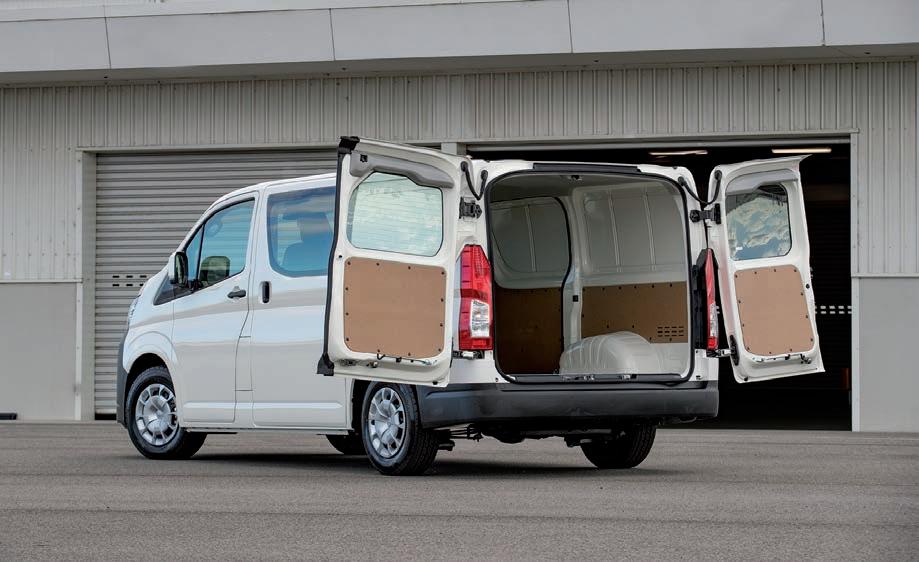
FUTURE TENSE
Linfox’s eCanter is servicing Coles Local, a new supermarket format by the retailer.
CHARGE OF THE LIGHT BRIGADE
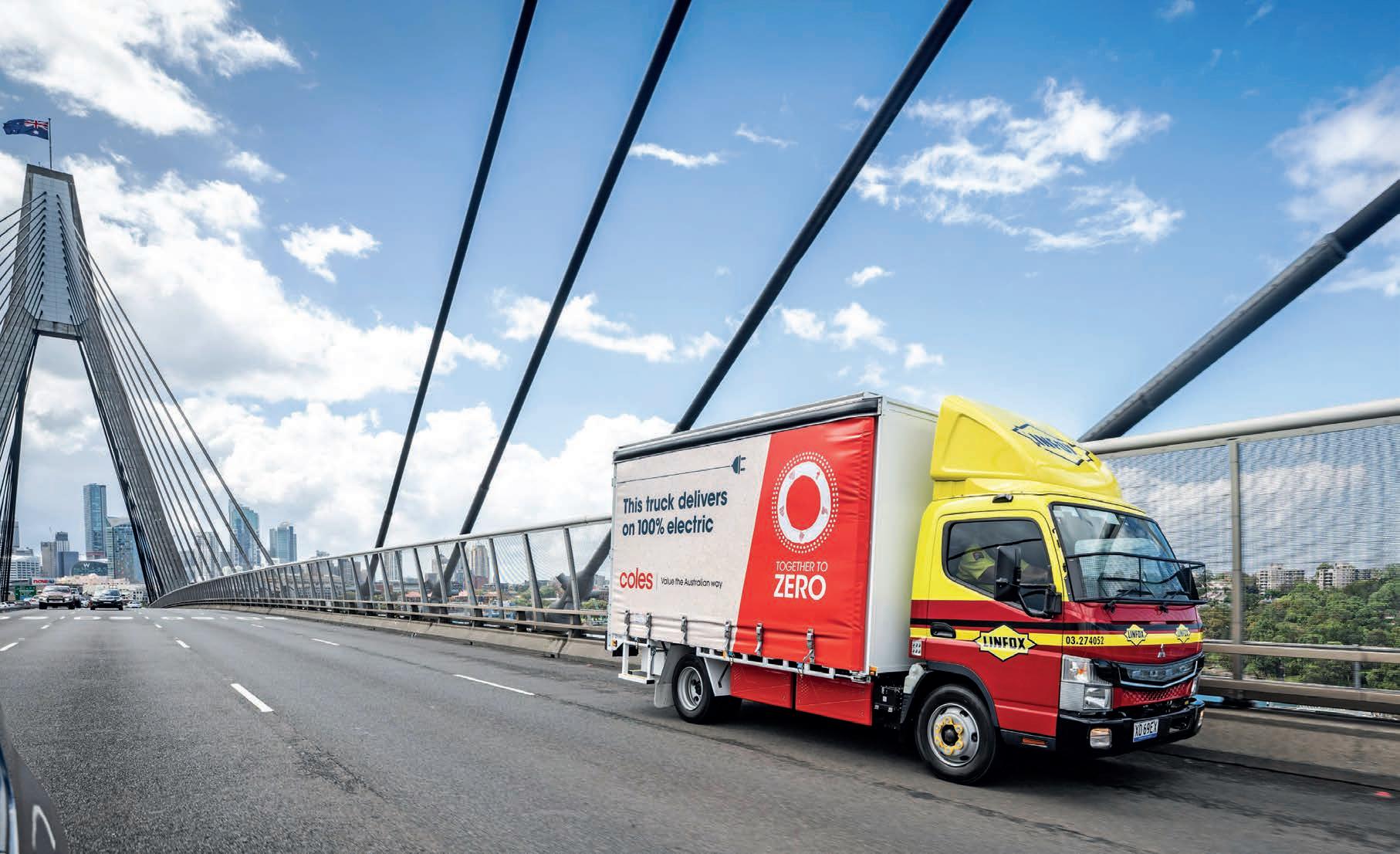
Coles and Linfox Logistics have partnered on a trial using the battery-powered Fuso eCanter to deliver stock across select locations in New South Wales.
An electric Fuso eCanter, the first deployed for Australian supermarket giant Coles, is servicing several of its stores in Sydney on behalf of Linfox Logistics. Products are loaded onto the all-electric truck at the Eastern Creek Distribution Centre where they are shuttled to Coles supermarkets and new format Coles Local stores, its new supermarket format tailored specifically according to the needs of local customers. These stores, which are cashless, incorporate a range of environmental initiatives to make it, per a Coles Group media release, the most sustainable Coles supermarket in Australia. The Fuso eCanter is part of an ongoing trial undertaken by Coles’ long-time transport partner Linfox Logistics and is expected to eventually help the organisations displace more than 60 tonnes of carbon dioxide equivalent emissions each year compared to the same size Euro 6 diesel powered truck. Introduction of the eCanter plays to a much larger initiative Coles is said to be tirelessly working towards — Together to Zero, sustainability ambitions that will eventually involve the deployment of electric vehicles into its fast-expanding home delivery fleet. The electric truck trial is a significant step in Coles’ Sustainability Strategy says David Clark, Head of Transport Safety & Sustainability – Supply Chain. “Coles’ first electric truck is a big step to introducing alternate fuel technologies to our supply chain, and we are excited about the opportunity to see more electric vehicles delivering groceries to our distribution centres and supermarkets in the future,” he says. “By working with Linfox, we have considered the sustainability of the truck, from its carbon footprint when operating, to the end-of-lifecyle
impacts on the environment.” Environmental practices are underpinning a swathe of new approaches in the development and supply of products from farm to plate. In Victoria and New South Wales, Coles has been working with farmers for the past two years to help them calculate and reduce their emissions. This consultive process has, according to Coles, resulted in lowering emissions 19 per cent below the Australian national average when based on the average emission per kilogram of live weight produced. This has subsequently led to the launch of a carbon neutral beef product that spans across seven premium quality cuts of beef. Work since 2020 with Dr Stephen Wiedemann, Principal Research Scientist at Integrity Ag & Environment, has, through studies, helped to yield innovations in tree planting and vegetation that have helped reduce net carbon emissions on beef farms through carbon sequestration. Carbon stored in trees is then included in the farm’s ‘carbon account’ and reduces the overall emissions associated with the farm’s production – a process known as carbon ‘insetting,’ in which the process of reducing emissions is carried out at or directly related to their source. Through its GreenFox program, Linfox is focused on reducing net carbon dioxide to zero, making it the ideal fit for the type of supplier partner Coles has sought out in alignment with its sustainability values. “We are proud to be working with Linfox Logistics to deliver Coles’ first electric truck. We are excited to see how electric truck technology evolves and are eager to continue working with Linfox to discover ways to reduce emissions in our supply chain through alternate fuel technologies,” says Clark, who claims the Fuso eCanter trial demonstrates how Coles can meet its lofty internal environmental ambitions together with transport partners to reduce its carbon footprint. The switch to electric vehicles will make the biggest difference, according to Linfox Logistics Executive Chairman Peter Fox, in light of the cumulative effect of Coles connecting customers with products from thousands of farmers and suppliers. “As a leading logistics provider that has traditionally relied on fossil fuels to transport goods, Linfox has made a commitment to find alternative sources of energy to power our customers’ supply chains,” says Fox. As a major supply chain partner, Linfox will use findings from this trial and its other electric vehicle trials to better understand how further scalable solutions can be integrated across the distribution network in Australia to keep Coles stores stocked with essential goods in a sustainable way. Coles customers that drive electric vehicles can also charge their cars while they shop at some Coles supermarket and Coles Express sites. To date, Coles has integrated electriccharging stations at 12 supermarket sites, and two additional Coles Express sites. Under the guidance of its major shareholders who include Wesfarmers, Vanguard Group, BlackRock and Norges Bank Investment Management, Coles aims to source 100 per cent renewable electricity by as early 2025.

Fuso eCanter in the Sydney CBD.
